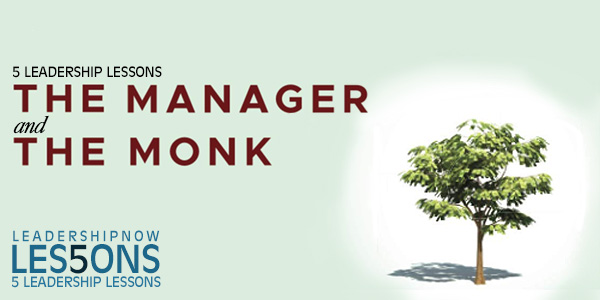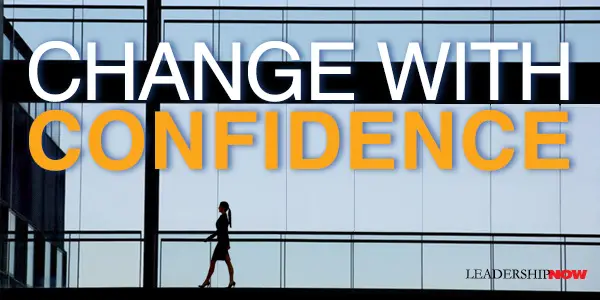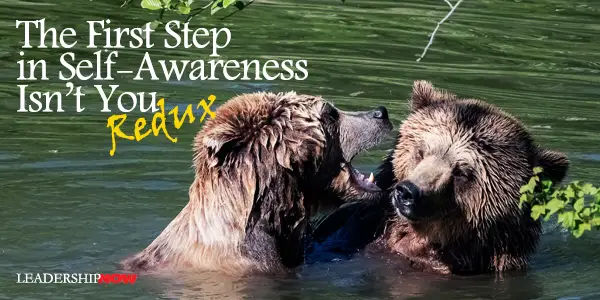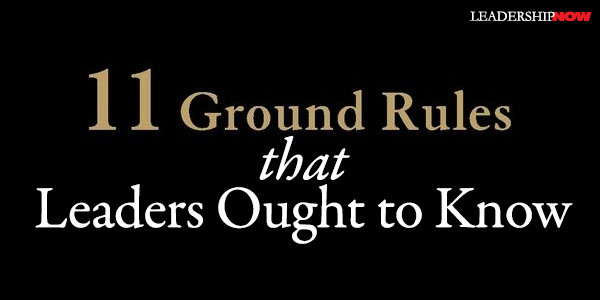 Leading Blog | Posts by Month |
 Leading Blog | Posts by Month |
05.31.13

LeadershipNow 140: May 2013 Compilation
See more on
Posted by Michael McKinney at 12:41 AM
05.23.13

5 Leadership Lessons: The Manager and the Monk
The Manager and the Monk is one of those books that comes along every now and again, that will shape and inspire your thinking. It is a deeply philosophical book with very practical applications. The book is essentially a conversation between Jochen Zeitz, the former Chairman and CEO of Puma, and Father Anselm Grün, the financial manager of the Münsterschwarzach Abby near Würzburg, Germany. Zeitz is also co-founder and co-chair with Sir Richard Branson of The B Team. Together Zeitz and Grün discuss important topics like success, culture, values, acting ethically, the environment, commerce, sustainability, strengths and weaknesses and awareness. The book reflects their concern to think beyond the immediate concerns of business to how decisions could affect other people and the environment around them. "We should always be aware of the effects of our decisions." In the moment, it is often hard to remember that principle. Here are several thoughts from the book:

Posted by Michael McKinney at 08:01 PM
05.21.13

Change with Confidence
Change with Confidence by Phil Buckley is a great handbook for working through a big change project. The book is organized around 50 critical and practical questions change leaders ask. The examples provided throughout the book mostly reflect his experience as co-lead in the global integration of Kraft and Cadbury. I think that this is some of the hardest change to lead because you are not just merging systems and processes but different organizational cultures. He reflects on the critical issues and the analysis is quite helpful.Buckley's approach is people-centered and emphasizes the responsibility of change and organizational leaders. Not surprisingly, the first question considered is "What do I bring to the project?" Knowing the answer helps you bring confidence and resolve to the change project. Buckley writes: Many change leaders don't realize that the people who must adopt the changes are the ones who control the long-term success of the project, and if they don't take on new ways of working (and stick with them), the project will ultimately fail and most benefits will be lost. Therefore, the best strategy for ensuring success is to work with people and make sure they have everything they need—including respect, encouragement, information, tools, and the opportunity to shape the change to fit their environment. Importantly, Buckley also deals with questions such as, "How do I manage my day job, change project, and life?" Not only will change projects test you as a leader in both your abilities and self control, they will eat up as much time as you give it. "A reasonable life balance will help you stay focused on all of your priorities." This book can help any change project from beginning to end and help you grow as a leader in the process. 
Posted by Michael McKinney at 11:50 PM
05.13.13

The First Step in Self-Awareness Isn’t You - Redux
HUMAN BEINGS—and that includes most leaders—are relational. Self-leadership is fundamental to good leadership, but it is not the end-game. Self-awareness for self-awareness sake has limited value. Through introspection and reflection we can get to know a great deal about ourselves—as far as we know. The problem is that we don't know what we don't know. Only when we are able to test our assumptions about ourselves, can we know if we are getting it right. It is when we see ourselves in relation to others and in relation to a higher purpose that we really begin to clarify (and many times even identify) our core values, beliefs and intentions. We can all know who we think we are, but it isn't until we get out and interact with others that we can begin to see where we are right and where we have been fooling ourselves. Who we are takes on meaning when it is in the context of our relationship with others. Superman's stance on "truth, justice, and the American Way" is pointless if he remains isolated in his Fortress of Solitude. His values only have meaning in relationship to other people. All the self-knowledge in the world counts for very little if it is not put to work in the service of others. Self-awareness that points to your unique contribution in the world is leadership. Who you are is leveraged when it is placed in the service of other people. Surely we must lead with integrity—in a manner consistent with who we are. However, the only way to know if we are really doing that is by looking at how we impact the lives of others—how our leadership is experienced by others. Self-awareness provides the opportunity for us to close the gap between who we think we are or want to be and who we actually are at a particular point in time. But that can only be achieved with feedback of some kind. I want to share a lengthy story provided by Scott Weiss in his great book DARE, to illustrate this point. It's a book about trust in leadership and the trust that is generated by knowing who you are and leading as that person. At thirty-five, I was already an executive vice president with Turner Broadcasting, overseeing two divisions and reporting directly to the second most senior executive who soon would be named the company's CEO. I believed that I was very much at the top of my game, already delivering a lot of high-level presentations, and getting consistently positive feedback. I was more than a little offended by the suggestion that I needed any help at all with my communication skills. But I went. I appreciate Scott Weiss sharing this story, for it's not just a process all growth-oriented leaders must go through, but a process we must seek out continuously. Feedback is a process that, if we allow it, will keep us honest with ourselves. We see things as we are, and we see ourselves through our intentions. Feedback gives us a reality check that we are free to accept or reject, but without it we have no way to combat our own self-deception. We must be able to experience ourselves in relation to other people if we are to have a genuine understanding of who we are and why we do what we do. So the place to begin if we truly want to know ourselves is to reflect on the impact that we have on others. Only then can we lead authentically knowing that our inner being is congruent with our outer behavior.
Posted by Michael McKinney at 12:09 AM
05.10.13

The First Step in Self-Awareness Isn’t You
IRONICALLY, the more self absorbed we are, the less self-aware we are. Self-awareness is vital to the development of a leader. But it's not navel-gazing. It is not an inward focus. It is an outward focus. Its ultimate goal is to improve our connection and effectiveness with others. The self-absorbed leader struggles with self-awareness and emotional intelligence because self-awareness is about how we are perceived by others. It's about understanding how our behaviors are affecting other people. And we just can't do that by focusing on ourselves. It is easy for us to focus on ourselves—to think people just don't understand us. And when we do, we tend to rationalize rather than grow. Explain rather than listen. Disconnect rather than lead. Self-important leaders can't see how they are sabotaging themselves because they focus on their needs and feelings and not those of their followers. Consequently, they don't encourage feedback because it never seems relevant to them. An inward focus dooms us to operate from a place of weakness—never able to see what is holding us back. It is in the character of great leaders to have a great appetite for feedback. It's a gift and still the best way to gain an awareness of ourselves. You might think of it as a personal scorecard. To see where we need to grow, we need to see how we affect other people. Only then can we begin the introspection that will lead us to a deeper understanding of ourselves and learn to move past unproductive thinking and develop new behaviors.
Posted by Michael McKinney at 06:52 PM
05.08.13

How to Make Your Ideas Contagious
AS leaders we need to understand how to make our ideas catch on. This is most effectively done through word of mouth and social influence. It's more persuasive than advertising and is more targeted to an interested audience. Jonah Berger shares the science behind word of mouth in Contagious and even teaches a class at The Wharton School by the same name. Interestingly, most people think that most word of mouth happens online. But research finds that only 7 percent of word of mouth happens online. "Offline discussions are more prevalent, and potentially even more impactful, than online ones. Berger presents many examples of contagious ideas that seem clever in hindsight. And we can learn from these. From these examples and his own research, he has assembled six principles or STEPPS for making products, ideas, and behaviors more likely to become popular: Social Currency: We share things that make us look good. Find the inner remarkability that makes people feel like insiders. Give people ways to achieve and provide visible symbols of status that they can show to others. Triggers: How do we remind people to talk about our products and ideas? People talk about what comes to mind. Top of mind leads to tip of tongue. There is immediate and ongoing word of mouth. Movies benefit from immediate word of mouth, but many ideas and initiatives benefit from ongoing word of mouth. What keeps people talking? Triggers. Think context. Think about whether the message will be triggered by the everyday environments of the target audience. "A strong trigger can be much more effective than a catchy slogan." Emotion: When we care, we share. Naturally contagious content usually evokes some sort of emotion. Not all emotions are equal. Awe is good. Sad is not. High-arousal emotions—awe, funny, anger, anxiety—are shared more than low-arousal emotions like contentment and sadness. Public: Built to show, built to grow. Making things more observable makes them easier to imitate; products and ideas that advertise themselves. Practical Value: Products and ideas we can use. Highlight the value and package our knowledge and expertise so that people can easily pass it on. Stories: People don't just share information, they tell stories. Information travels under the guise of what seems like idle chatter. Embed your products and ideas in stories that people want to tell. The more of these principles you use the better, but not all are required to make your idea contagious. 
Posted by Michael McKinney at 11:49 PM
05.07.13

11 Ground Rules that Leaders Ought to Know
PHILLIP VAN HOOSER has condensed his leadership experience down to 11 ground rules that Leaders Ought to Know. Van Hooser begins with the fact that leaders are made: Leadership is a choice, reinforced by individual effort. In his earlier days, he was moved by a comment that Deming wrote in Out of the Crisis:Long-term commitment to new learning and new philosophy is required of any management that seeks transformation. The timid and the fainthearted, and the people that expect quick results, are doomed to disappointment. His choice to be a leader has proven to be his most important professional decision. And it could be yours too. But as Deming noted it takes deliberate work and is not a quick transformation. It is the choice to make the effort that makes a leader. The choice can be made by anyone anywhere because leadership is not a title. It is, as he states in ground rule 2, the ability to offer service and the willingness to take action—especially on those things we already know we should be doing, but aren't. He continues with ground rules on earning respect, integrity, motivation, preventive leadership, courage, leadership pitfalls, and some good commonsense. Ground Rule 3: Leaders cannot function in a vacuum; Leadership requires willing and able followers.
Van Hooser on keeping your distance: You can be a supervisor or manager without getting close to your followers; however, you cannot be a leader unless you get close to your followers. Van Hooser was given this advice on parenting: "You may not always be able to predict what your child will do, or say, or think. But you're the father; your child must always be able to predict with certainty what you will do, or say, or think. That way, he can adapt and adjust his behavior to yours." He relates it to leadership: A leader's consistency provides a predictive foundation from which followers can begin to think, decide, and act. If a leader does not establish that foundation, he or she—albeit unintentionally—creates confusion, uncertainty, and potentially chaos in the followers' minds. 
Posted by Michael McKinney at 08:21 PM
05.03.13

How to Make Better Decisions
"Why do we have such a hard time making good choices?" ask Chip and Dan Heath in Decisive. "A remarkable aspect of your mental life," says Daniel Kahneman, "is that you are rarely stumped." We have opinions about nearly everything and are quick to jump to conclusions based only on the information that is right in front of us. We often just go with our gut. And that hasn't always served us well. • An estimated 61,535 tattoos were reversed in the United States in 2009. • Forty-one percent of first marriages end in divorce. • Forty-four percent of lawyers would not recommend a career in law to young people. • Eighty-three percent of corporate mergers and acquisitions fail to create any value for shareholders. The Heath brothers have identified “four villains” when it comes to making decisions:
What can we do? We can counteract our tendencies with these four strategies the authors call the WRAP Process from the first letter of each step:
Making better decisions is a choice. This process will help us to make better choices.

Posted by Michael McKinney at 12:09 AM
05.01.13

First Look: Leadership Books for May 2013Here's a look at some of the best leadership books to be released in May.




For bulk orders call 1-800-423-8273  Build your leadership library with these specials on over 120 titles. All titles are at least 40% off the list price and are available only in limited quantities. “You cannot open a book without learning something.” — Confucius
Posted by Michael McKinney at 01:01 AM
|
BUILD YOUR KNOWLEDGE


How to Do Your Start-Up Right STRAIGHT TALK FOR START-UPS 
Grow Your Leadership Skills NEW AND UPCOMING LEADERSHIP BOOKS 
Leadership Minute BITE-SIZE CONCEPTS YOU CAN CHEW ON 
Classic Leadership Books BOOKS TO READ BEFORE YOU LEAD |
|